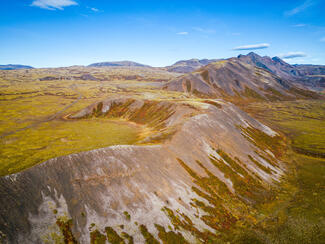Iceland has declared a state of emergency following a series of potent earthquakes that have struck the southwestern Reykjanes peninsula, heightening the probability of a volcanic eruption in the area. The Department of Civil Protection and Emergency Management issued a statement citing the intense seismic activity at Sundhnjukagigar, north of Grindavik, as the reason for the emergency declaration.
The Icelandic Met Office (IMO) has warned that these seismic events could escalate and potentially lead to a volcanic eruption, possibly within several days. The village of Grindavik, with a population of around 4,000, is situated just 3 kilometers southwest of the epicenter of the recent earthquake swarm. The community has evacuation plans prepared in case of an eruption.
Two significant earthquakes, the largest measuring a magnitude of 5.2, were felt as far as Reykjavik, about 40 kilometers away, and across much of Iceland's southern coast. These tremors caused noticeable shaking of windows and household items. A key road to Grindavik was closed after it suffered damage from the earthquakes.
Since late October, the Reykjanes peninsula has experienced over 24,000 tremors, with nearly 800 quakes recorded in a single day. The IMO has detected an accumulation of magma at a depth of approximately 5 kilometers underground. If this magma begins to move towards the surface, it could trigger a volcanic eruption.
The IMO suggests that it might take several days for the magma to reach the surface. In the event of a fissure opening in the area of highest seismic activity, lava flows are expected to head southeast and west, but not towards Grindavik.
Iceland has witnessed three eruptions on the Reykjanes peninsula since 2021, occurring in March 2021, August 2022, and July 2023. Fortunately, these eruptions were located away from populated areas and infrastructure.
The Blue Lagoon, a famous geothermal spa near Grindavik, closed as a precaution following another earthquake swarm. Additionally, the Svartsengi geothermal plant, which supplies electricity and water to 30,000 residents on the peninsula, has contingency plans to safeguard the facility and its workers in case of an eruption.
Iceland, known for its active volcanic systems, has the highest number of such systems in Europe, totaling 33. The country remains vigilant as it prepares for potential volcanic activity, underscoring the dynamic and often unpredictable nature of its geological landscape.


